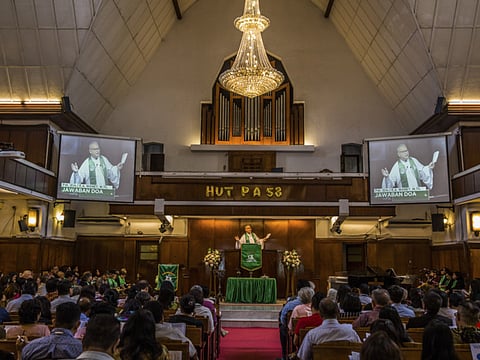In Indonesia, a mosque and a church foster friendship amid religious tensions
Despite different faiths, the houses of worship are friendly, helpful neighbours

JAKARTA, Indonesia
On a tree-lined side street in the Indonesian capital sits a colonial-era Protestant church with rustic wooden pews and stained-glass windows, and an antique pipe organ built into a large wall behind the altar.
Across the street is a modern, 100,000-square-foot mosque with towering arches at its entrances and a cavernous prayer area laid wall-to-wall with red carpet.
Despite their different faiths, the two houses of worship are friendly, helpful neighbours — and an example of pluralism in the world’s most populous Muslim-majority nation at a time of heightened fears over religious intolerance.
“We respect each other,” said Nur Alam, an imam at the Sunda Kelapa Grand Mosque, which opened in 1971. “If we never offend other people, then we will be respected.”
Across the street, Adriaan Pitoy is a pastor at St Paul’s Church, which was built in 1936 under the Dutch colonial administration. “Our relationship is just one of many steps we take,” he said of the neighbours at the mosque. “We also go to other mosques to promote dialogue. Our relationship with our friends next door is normal.”
For the two houses of worship, normal means sharing parking spaces during busier services: Friday Prayer for the mosque, Sunday Mass for the church. They also host interfaith dialogue sessions, and even volleyball tournaments. During Ramadan, the Muslim holy fasting month, the staff at St Paul’s, some of whom are Muslim, carry boxes of food to the mosque for worshippers there to break their fast.
This type of religious harmony among neighbouring houses of worship is evident not just in Jakarta, but across the Indonesian archipelago. About 90 per cent of Indonesia’s 260 million people are identified as Muslim, but the country also has small but influential Christian, Hindu, Buddhist and Confucian populations.
Yet these friendly relations are regularly overshadowed by international news reports and social media posts about racial intolerance and fears of the “Islamisation” of Indonesia.
In recent years, there have been hundreds of cases of hardline Islamist groups harassing, attacking and in some cases even killing religious minorities including Christians, Shiites and members of the Ahmadiyah, and forcibly closing hundreds of churches and other houses of worship across the country.
Then there is Indonesia’s domestic terrorism, dating back to 2000, including multiple bombings and attacks in Jakarta and the resort island of Bali by terrorist cells that pledged loyalty to Al Qaida or Daesh.
Hardline groups
“If you see the actions of these hardline groups, and threats from Daesh, or Indonesian militants coming back from Syria, they are a threat to interfaith cooperation in Indonesia,” said Theophilus Bela, former president of the Jakarta Christian Communication Forum.
A recent local challenge to religious harmony can be found in the case of Jakarta governor Basuki Tjahaja Purnama who is serving a two-year sentence for blaspheming Islam in a case that ignited violent street marches through Jakarta by hardline Islamist groups. They demanded he be prosecuted or lynched outright for citing a verse of the Quran that warns Muslims against taking Christians and Jews as allies.
Despite the case and its stoking of Muslim-Christian tensions, both Nur and Pitoy contend that the episode of Basuki was more political than religious. “The people of Indonesia know that there have been conflicts among religious groups, but actually it’s not really just because of religious faith, but maybe it’s political, economic and things like that,” Pitoy said.
In response to the fall of Basuki, who used to attend Sunday Mass at St Paul’s, Indonesia’s president, Joko Widodo, one of his key political allies, established a special task force to reinforce the country’s state ideology, known as Pancasila, which enshrines pluralism.
Nur and Pitoy both said Indonesia’s core problem with religion is not intolerance, but a lack of education and understanding among its people. Less than half of all Indonesians have completed primary school, according to the government’s statistical bureau.
“Indonesia is Muslim-majority — you have to accept it — but the lower class has a very simple knowledge” of Islam, Nur said. “That is why, if you want to know about the essence of Islam, which is peace and tolerance, study the Quran.”
— New York Times News Service
Sign up for the Daily Briefing
Get the latest news and updates straight to your inbox



